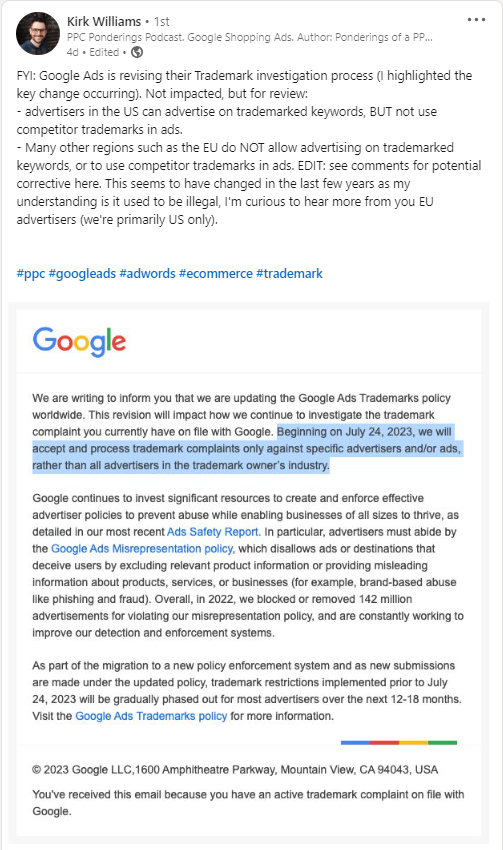In case you missed it, Google Ads announced significant changes to its trademark policy.
On Thursday, Google emailed advertisers who currently have a trademark complaint on file with Google about the upcoming policy updates. Since the email announcement went out to select advertisers with an active complaint on file, Kirk Williams took to Twitter to alert other advertisers in the industry.
What’s Changing In The Trademark Policy
Per Google, significant changes are taking effect on July 24, 2023. Specifically, Google stated:
Beginning on July 24, 2023, we will accept and process trademark complaints only against specific advertisers and/or ads, rather than all advertisers in the trademark owner’s industry.
Migration to the new policy system will be phased over time and as new trademark complaints are filed under the new policy.
Any trademark restrictions implemented before July 24 will be gradually phased out for most advertisers in the next 12-18 months.
What’s Not Being Impacted By The New Policy
Williams shared in more detail what’s not changing as part of the updated policy in a LinkedIn post:
 Image credit: Kirk Williams, LinkedIn.com, June 2023
Image credit: Kirk Williams, LinkedIn.com, June 2023To break it down, these specific policies haven’t changed and still uphold:
- Advertisers in the United States and the EU can still bid on trademarked keywords. They cannot use competitor trademarks in the ad copy.
- Some countries in the EU may not allow advertising on trademarked keywords. Other countries have recently allowed it in recent years.
What This Means For Advertisers
The new policy states that new complaints will process trademark complaints against specific advertisers or ads, not all in the trademark owner’s industry.
When new trademark complaints are filed, Google will investigate only the specific advertiser(s) the trademark owner observes.
Ginny Marvin, Google Ads Liason, further explained how this impacts advertisers via Twitter.
Under this new process, you’ll still be able to make complaints at the advertiser level. It should also reduce overflagging & trademark owners won’t need to constantly flag when they want to authorize new accounts (including their own) to use their trademark
— AdsLiaison (@adsliaison) June 8, 2023
Marvin went on to explain expected efficiencies with the new policy:
- Complaints can still be made at the advertiser level
- Reduction in overflagging
- Trademark owners won’t need to constantly flag when they want to authorize new accounts to use their trademark.
It’s speculated that more prominent, well-known brands will be impacted the most and should be on the lookout. In the short term, it could cause additional administrative work to file new complaints after July 24.
Additional speculation in the Twitter thread made valid points around using standard trademark terms, such as “iPhone” or “iPad,” in the ad copy. That is until the trademark owner files a complaint.
Summary
If you’re an advertiser who has previously made a trademark complaint, be on the lookout for potential new defendants during the next 12-18 months.
For advertisers bidding on competitor terms, bidding on branded keywords is still acceptable. Including another trademark owner’s name in your ads is still a violation.
The entire Google policy can be found here: https://support.google.com/adspolicy/answer/6118?hl=en.
Thanks to Kirk Williams for spotting the policy update and Ginny Marvin for additional clarification for advertisers.
Featured Image: Olivier Le Moal/Shutterstock
